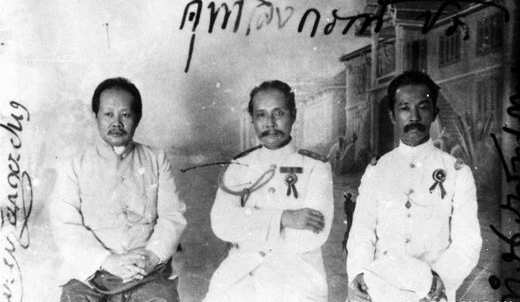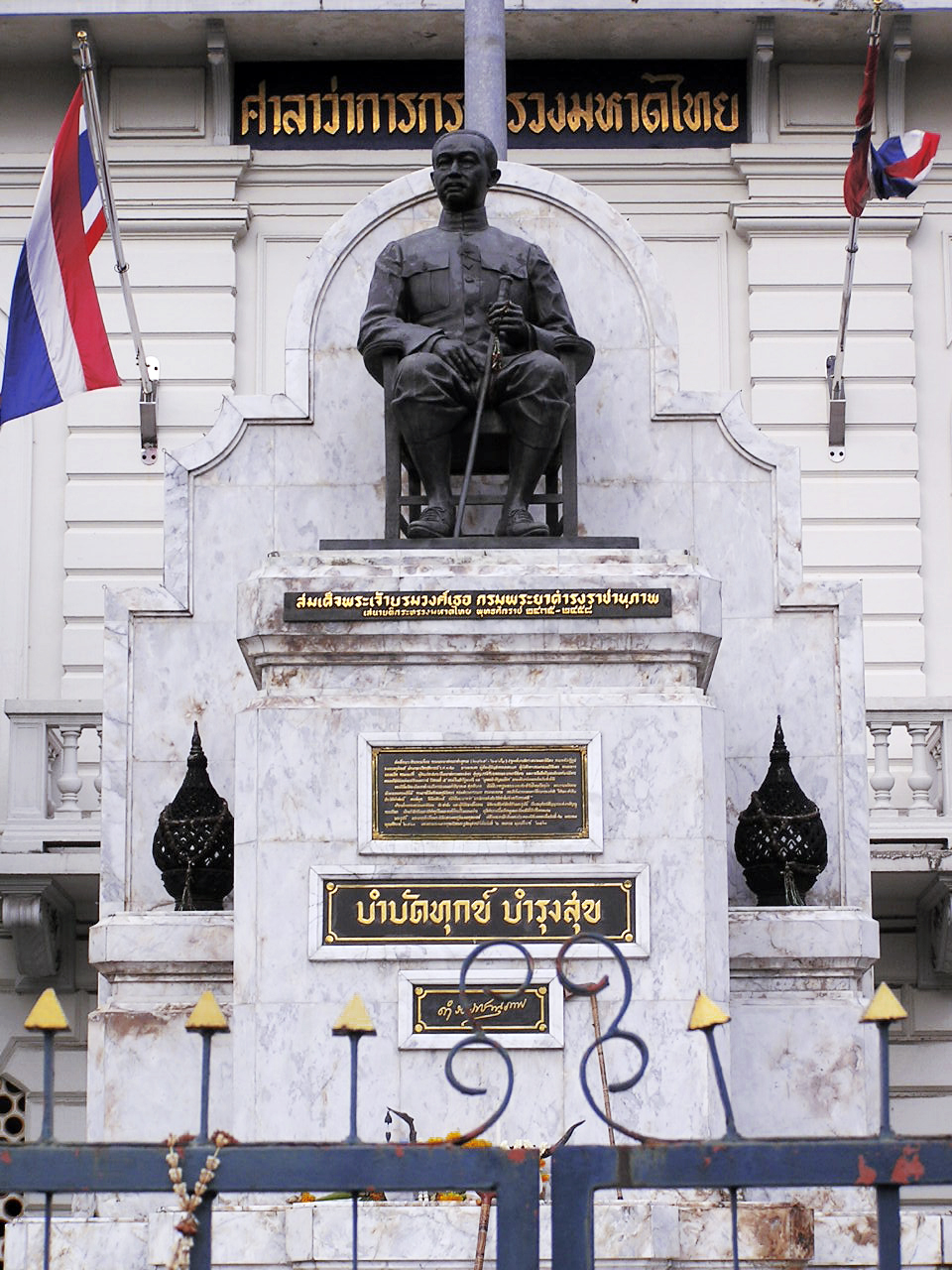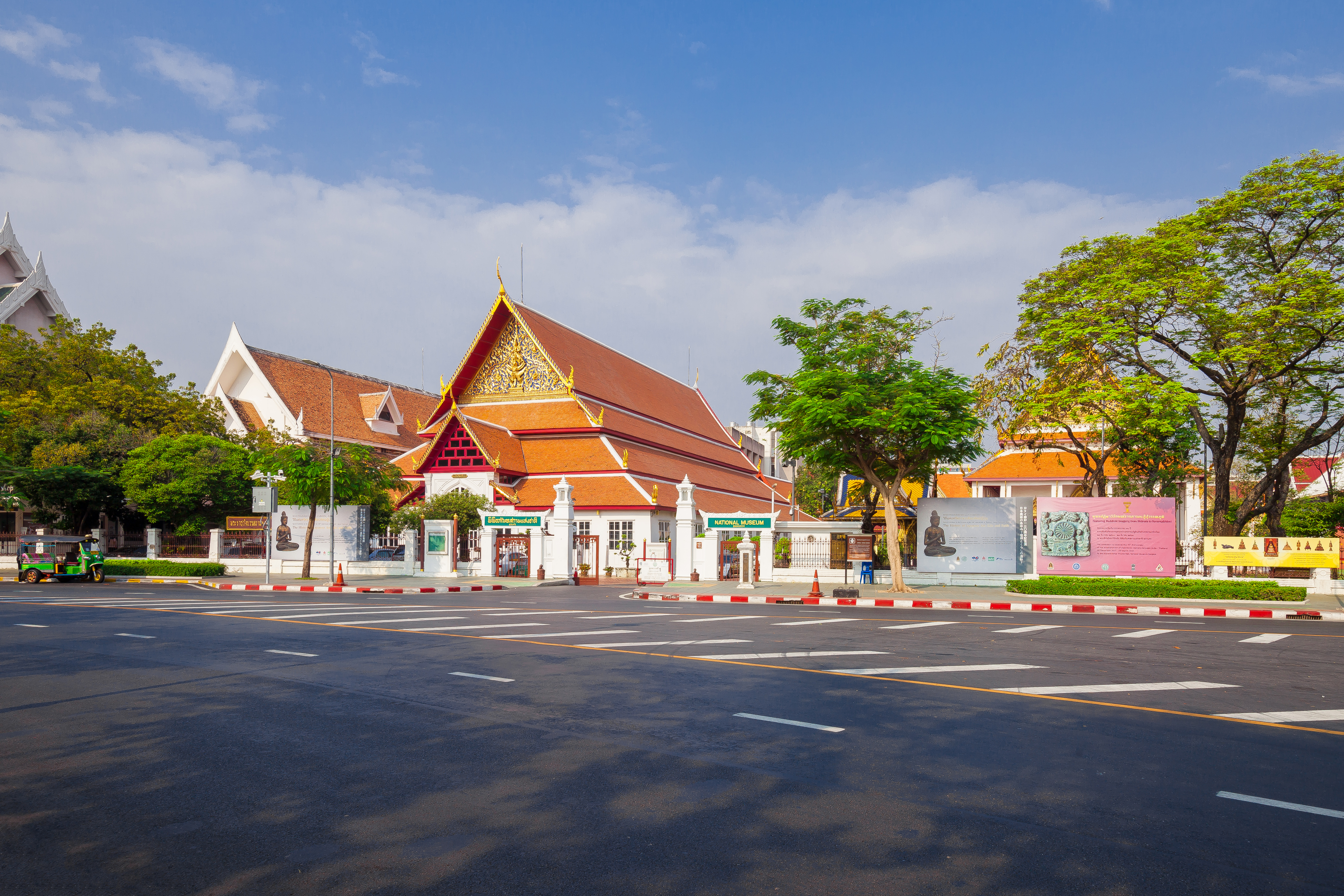|
Prince Damrong
Prince Tisavarakumarn, the Prince Damrong Rajanubhab (Thai language, Thai: ; Full transcription is "Somdet Phrachao Borommawongthoe Phra-ongchao Ditsawarakuman Kromphraya Damrongrachanuphap" (สมเด็จพระเจ้าบรมวงศ์เธอ พระองค์เจ้าดิศวรกุมาร กรมพระยาดำรงราชานุภาพ)) (21 June 1862 – 1 December 1943) was the founder of the modern Thailand, Thai educational system as well as the modern provincial administration. He was an Autodidacticism, autodidact, a (self-taught) historian, and one of the most influential Thai intellectuals of his time. Born as ''Phra Ong Chao Tisavarakumarn'' (พระองค์เจ้าดิศวรกุมาร; "Prince Tisavarakumarn"), a son of King Mongkut with Consort Chum (เจ้าจอมมารดาชุ่ม; Chao Chom Manda Chum), a lesser royal wife; he initially learned Thai language, Thai and Pāli, Pali ... [...More Info...] [...Related Items...] OR: [Wikipedia] [Google] [Baidu] |
Ministry Of Interior (Thailand)
The Ministry of Interior of the Kingdom of Thailand ( Abrv: MOI; th, กระทรวงมหาดไทย, ) is a cabinet-level department in the Government of Thailand. The ministry has wide ranging responsibilities. It is responsible for local administration, internal security, citizenship, disaster management, road safety, land management, issuance of national identity cards, and public works. The ministry is responsible for appointing the 76 governors of the Provinces of Thailand. The Minister of Interior ( th, รัฐมนตรีกระทรวงมหาดไทย) is the head of the ministry. He is appointed by the King of Thailand on the recommendation of the prime minister. Since 30 August 2014, the head of the ministry has been retired General Anupong Paochinda. He is aided by two deputy ministers. The FY2019 budget of the ministry is 371,802 million baht. History The ministry in its present form was founded on 1 April 1892 by King Chulalongkorn (Rama ... [...More Info...] [...Related Items...] OR: [Wikipedia] [Google] [Baidu] |
Bowring Treaty
The Bowring Treaty was a treaty signed between the British Empire and the Kingdom of Siam on 18 April 1855. The treaty had the primary effect of liberalizing foreign trade in Siam, and was signed by five Siamese plenipotentiaries (among them Wongsa Dhiraj Snid, one of the King's half-brothers) and Sir John Bowring, the British envoy and colonial governor of Hong Kong. Background The Burney Treaty had been signed between the Kingdom of Siam and the British Empire in 1826, coming about as a result of the two powers having a mutual opposition to the Ava Kingdom. That treaty had failed to settle commercial issues, leading to the arrival of Sir John Bowring to Siam in order to negotiate a new one. The treaty negotiated by him allowed free trade by foreign merchants in Bangkok, as all foreign trade had previously been subject to heavy taxation by the Siamese Crown. The treaty also allowed the establishment of a British consulate in Bangkok and guaranteed its full extraterritorial ... [...More Info...] [...Related Items...] OR: [Wikipedia] [Google] [Baidu] |
National Museum (Thailand)
The national museums ( th, พิพิธภัณฑสถานแห่งชาติ, ) of Thailand are operated by the Fine Arts Department of the Ministry of Culture, and are responsible for the safeguarding of state-owned historical and cultural artefacts. In 1926 King Prajadhipok created the Royal Institute of Art, Literature and Archaeology, which then opened the museum in Bangkok at the Wang Na palace. Today () there are 43 national museum branches operated across the country. List of museums Central * Bangkok National Museum (Bangkok) * Kanchanaphisek National Museum (Pathum Thani) * National Museum of Royal Barges (Bangkok) * Royal Elephant National Museum (Bangkok) * Benchamabopit National Museum (Bangkok) * The National Gallery (Bangkok) * Silpa Bhirasri National Museum (Bangkok) * Chao Samphraya National Museum (Ayutthaya) * Chantharakasem National Museum (Ayutthaya) * Narai National Museum (Lopburi) * Inburi National Museum ( Singburi) * Chainatmuni ... [...More Info...] [...Related Items...] OR: [Wikipedia] [Google] [Baidu] |
National Library Of Thailand
The National Library of Thailand ( th, หอสมุดแห่งชาติ) is the legal depositary and copyright library for Thailand. It was officially established on 12 October 1905, after the merger of the three existing royal libraries, and is one of the oldest national libraries in Asia. It operates under the jurisdiction of the Fine Arts Department of the Ministry of Culture in Bangkok, Thailand. , the library in Bangkok housed over three million items and had 11 provincial branches. Its budget was 87 million baht and it employed about 200 staff. Background The National Library of Thailand's main tasks are collecting, storing, preserving, and organizing all national intellectual property regardless of medium. Collections include Thai manuscripts, stone inscriptions, palm leaves, Thai traditional books, and printed publications as well as audio-visual materials and digital resources. The library is a national information resource serving citizens nationwide. T ... [...More Info...] [...Related Items...] OR: [Wikipedia] [Google] [Baidu] |
The Royal Institute Of Thailand
The Royal Society ( th, ราชบัณฑิตยสภา, , ) is the national academy of Thailand in charge of academic works of the government. The secretariat of the society is the Office of the Royal Society ( th, สำนักงานราชบัณฑิตยสภา, ), formerly known as the Royal Institute ( th, ราชบัณฑิตยสถาน, ). The office is an independent agency under the prime minister's supervision. The Royal Society was established on 19 April 1926 and was dissolved on 31 March 1934. The dissolved society was split into the Royal Institute and the Fine Arts Department. On 14 February 2015, the Royal Institute was reorganised. Its administrative council became the Royal Society, whilst the institute itself became the office of the society. According to the present structure, the members of the Royal Society are of three types: associate fellows, fellows, and honorary fellows. The associate fellows are experts selected and ... [...More Info...] [...Related Items...] OR: [Wikipedia] [Google] [Baidu] |
Prajadhipok
Prajadhipok ( th, ประชาธิปก, RTGS: ''Prachathipok'', 8 November 1893 – 30 May 1941), also Rama VII, was the seventh monarch of Siam of the Chakri dynasty. His reign was a turbulent time for Siam due to political and social changes during the Revolution of 1932. He is to date the only Siamese monarch of the Chakri Dynasty to abdicate. Early life Somdet Chaofa Prajadhipok Sakdidej ( th, สมเด็จเจ้าฟ้าประชาธิปกศักดิเดชน์) was born on 8 November 1893 in Bangkok, Siam (now Thailand) to King Chulalongkorn and Queen Saovabha Phongsri. Prince Prajadhipok was the youngest of nine children born to the couple. Overall he was the king's second-youngest child (of a total of 77), and the 33rd and youngest of Chulalongkorn's sons. Unlikely to succeed to the throne, Prince Prajadhipok chose to pursue a military career. Like many of the king's children, he was sent abroad to study, going to Eton Co ... [...More Info...] [...Related Items...] OR: [Wikipedia] [Google] [Baidu] |
Absolute Monarchy
Absolute monarchy (or Absolutism (European history), Absolutism as a doctrine) is a form of monarchy in which the monarch rules in their own right or power. In an absolute monarchy, the king or queen is by no means limited and has absolute power, though a limited constitution may exist in some countries. These are often Hereditary monarchy, hereditary monarchies. On the other hand, in constitutional monarchies, in which the authority of the head of state is also bound or restricted by the constitution, a legislature, or unwritten customs, the king or queen is not the only one to decide, and their entourage also exercises power, mainly the prime minister. Absolute monarchy in Europe declined substantially following the French Revolution and World War I, both of which led to the popularization of theories of government based on the notion of popular sovereignty. Absolute monarchies include Brunei, Eswatini, Oman, Saudi Arabia, Vatican City, and the individual emirates compos ... [...More Info...] [...Related Items...] OR: [Wikipedia] [Google] [Baidu] |
Vajiravudh
Vajiravudh ( th, วชิราวุธ, , 1 January 188126 November 1925) was the sixth monarch of Siam under the Chakri dynasty as Rama VI. He ruled from 23 October 1910 until his death in 1925. King Vajiravudh is best known for his efforts to create and promote Siamese nationalism. His reign was characterized by Siam's movement further towards democracy and minimal participation in World War I. He had keen interests in Siamese history, archaeology, and literature, as well as economics, politics and world affairs, and founded the country's first university, Chulalongkorn University. Education Vajiravudh was born on 1 January 1881 to Chulalongkorn and one of his four queens and half sister Saovabha Phongsri. In 1888, upon coming of age, Vajiravudh received the title ''Krom Khun'' Thep Dvaravati (Prince of Ayutthaya). Prince Vajiravudh was first educated in the royal palace in Thai and English. His full siblings were Bahurada Manimaya, Tribejrutama Dhamrong, Chakrabongs ... [...More Info...] [...Related Items...] OR: [Wikipedia] [Google] [Baidu] |
Prince Devawongse
A prince is a male ruler (ranked below a king, grand prince, and grand duke) or a male member of a monarch's or former monarch's family. ''Prince'' is also a title of nobility (often highest), often hereditary, in some European states. The female equivalent is a princess. The English word derives, via the French word ''prince'', from the Latin noun , from (first) and (head), meaning "the first, foremost, the chief, most distinguished, noble ruler, prince". Historical background The Latin word (older Latin *prīsmo-kaps, literally "the one who takes the first lace/position), became the usual title of the informal leader of the Roman senate some centuries before the transition to empire, the ''princeps senatus''. Emperor Augustus established the formal position of monarch on the basis of principate, not dominion. He also tasked his grandsons as summer rulers of the city when most of the government were on holiday in the country or attending religious rituals, and, fo ... [...More Info...] [...Related Items...] OR: [Wikipedia] [Google] [Baidu] |
Francis Bowes Sayre, Sr
Francis may refer to: People *Pope Francis, the head of the Catholic Church and sovereign of the Vatican City State and Bishop of Rome *Francis (given name), including a list of people and fictional characters *Francis (surname) Places *Rural Municipality of Francis No. 127, Saskatchewan, Canada *Francis, Saskatchewan, Canada **Francis (electoral district) *Francis, Nebraska *Francis Township, Holt County, Nebraska *Francis, Oklahoma * Francis, Utah Other uses * ''Francis'' (film), the first of a series of comedies featuring Francis the Talking Mule, voiced by Chill Wills *''Francis'', a 1983 play by Julian Mitchell *FRANCIS, a bibliographic database * ''Francis'' (1793), a colonial schooner in Australia *Francis turbine, a type of water turbine *Francis (band), a Sweden-based folk band * Francis, a character played by YouTuber Boogie2988 See also *Saint Francis (other) *Francies, a surname, including a list of people with the name *Francisco (other) * Francisc ... [...More Info...] [...Related Items...] OR: [Wikipedia] [Google] [Baidu] |
Jens Westengard
Jens Iverson Westengard (September 15, 1871 – September 17, 1918) was a Danish American legal scholar and diplomat. He was a faculty member at Harvard Law School, first assistant professor (1899–1903), later Bemis Professor of International Law (1915–1918). Between 1903 and 1915, Westengard served as a General Advisor in Foreign Affairs to the Government of Siam. Early life and education Westengard was born in Chicago, the son of Abel August and Nielsigne Dorthea (Iverson) Westengard. His father emigrated from Denmark to the United States in 1863. He attended Chicago public schools and found work as a stenographer. Saving his money to fulfill an ambition to practice law, he paid the tuition to enter Harvard Law School in the fall of 1895. Earning the LL.B.degree in 1898, he graduated second in his class of 129; he entered the Massachusetts bar in the same year. He taught on the faculty of Harvard Law School until 1903. General Advisor to Siamese government In 1903 We ... [...More Info...] [...Related Items...] OR: [Wikipedia] [Google] [Baidu] |
Edward Henry Strobel
Edward Henry Strobel (December 7, 1855 – January 15, 1908) was a United States diplomat and a scholar in international law. Strobel was born in Charleston, South Carolina on December 7, 1855. He was educated at Harvard College and at Harvard Law School. He was admitted to the New York bar in 1883. In 1885 he was appointed Secretary of the Legation of the United States to Spain, serving until 1890. Based on notes from his period in Madrid, Strobel wrote a book on the Spanish revolution in 1868. Strobel returned to become Third Assistant Secretary of State in Washington, D.C. during 1893–1894. He served as U.S. Minister to Ecuador in 1894, and to Chile from 1894 to 1897. He returned to Boston in 1898 to become the Bemis Professor of International Law. In 1903 Strobel took a leave of absence to represent the Kingdom of Siam at the International Peace Court in The Hague in 1903. In 1906 he moved to Bangkok to become the American Adviser in Foreign Affairs to the government Kin ... [...More Info...] [...Related Items...] OR: [Wikipedia] [Google] [Baidu] |



.jpg)
.jpg)




